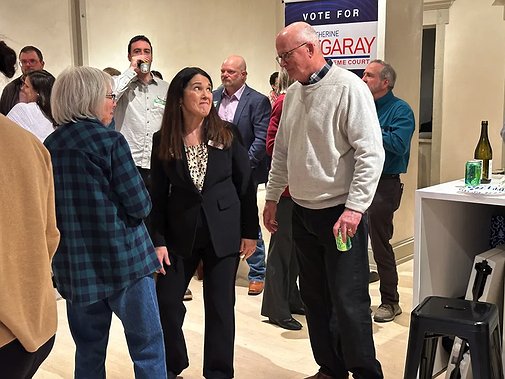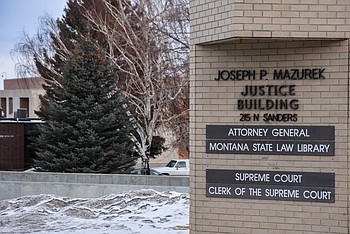Three vie to replace state Supreme Court Justice Dirk Sandefur
ARREN KIMBEL-SANNIT Montana Free Press | Daily Inter-Lake | UPDATED 10 months AGO
The stage is set for a three-way contest to replace retiring Montana Supreme Court Justice Dirk Sandefur, a race featuring two district court judges and a man who says he’s running to “break the monopoly of the bar association.”
And like the concurrent race to replace Chief Justice Mike McGrath, it’s an election that — despite whatever the officially nonpartisan candidates for the seat may say — is already defined by the high-stakes politics of constitutional law in Montana.
The two judges vying for the seat are Flathead County District Court Judge Dan Wilson and 7th Judicial District Judge Katherine Bidegaray, whose adjudicatory domain includes Dawson, McCone, Prairie, Richland and Wibaux counties. And Monday afternoon, less than two hours before the deadline to file to run for the seat, former Columbia Falls Republican lawmaker Jerry O’Neil threw his name in the hat.
And as to the race’s politicized nature, just ask Republican Gov. Greg Gianforte, who has donated $700 to Wilson’s 2024 campaign and said in an interview earlier this year that he believes the Montana Supreme Court is “making political decisions.” Or ask former Montana Supreme Court Justice Mike Wheat, who, at a Missoula campaign stop in support of Bidegaray last month, described a contest between the “right wing” and the “right side.”
“They want to win the court. They want to own the Montana Supreme Court,” he said. “Because as you can see, they’ve got the supermajority in the Legislature. They’ll pass whatever they want and they want a court that will uphold it.”
It’s a narrative that should by now be familiar to those who have followed recent judicial elections. Going back to Wheat’s own election over Lawrence VanDyke in 2014 and beyond, races for Supreme Court in Montana are increasingly expensive, intensely political affairs, and not without reason: Supreme Court justices adjudicate, among almost every lower court appeal in the state, cases related to the constitutionality of legislation and the rights those constitutional claims implicate — abortion chief among them. The fervor generated by these races only grew following the election of Republican Gov. Gianforte in 2020 and the subsequent 2021 legislative session’s separation-of-powers fight between the Supreme Court and Republican lawmakers and executive officials.
So far this year, there’s been more partisan fire in the race for the chief justiceship, where the most prominent candidates are former federal magistrate court judge Jerry Lynch and Broadwater County Attorney Cory Swanson. But, as Wheat said at the February fundraiser, the time for Bidegaray’s race to face the partisan flames will soon come.
For his part, Dan Wilson, a longtime attorney who was sworn in as a district court judge in 2017 after six years serving as Flathead County justice of the peace, says he’s not particularly concerned by the political turmoil surrounding the court.
“I am a great believer in the long view of history,” he told Capitolized. “I know that many in Montana are upset about what has happened or what may happen in the future with regard to legislation, court decisions and the like. And I guess I’ve been in the business long enough to really have more faith in the decency and basic respect that Montanans have for one another to feel that the past few years is anything but the inevitable buckle and strain that comes about when people of widely differing views are trying to fashion an appropriate and reasonable public policy. So I’m an optimist.”
Wilson comes from a multigenerational Montana family that first established itself near Malta. His grandfather was for a time a Phillips County justice of the peace. Wilson, who graduated from the University of Minnesota Law School, began his career as a prosecutor but later worked in several varieties of private practice on the sides of plaintiffs and respondents alike.
“I’d say that at the end of nearly 20 years of practice as an attorney with such a wide variety of those life experiences, looking at the facts and the law in the case from nearly every different perspective, I realize that what became more important to me than merely winning a case was the desire and perhaps the larger impulse to search the evidence for the truth, and then to apply the law faithfully to reach the result that the law requires,” he told Capitolized. “And it was then I realized that, to keep working in our judicial system, I’d rather work as a judge than as a lawyer.”
He said the changes he’d like to see on the court are rather “pedestrian” given the grand scale of rhetoric about the impact of the Montana judiciary. For one, he said, he’d like the court to issue fewer “non cite” opinions — in other words, for it to issue more opinions that create precedent. And he said he’d like to see more public arguments before the court for transparency’s sake.
Asked whether he thinks the court is prone to “legislating from the bench” — a criticism oft lobbed by Republicans who claim the court is wrongly finding their bills unconstitutional — he said he’s “not really in a position to criticize” the justices.
“Whether I win or lose this election, I’m going to be for the entire campaign a district court judge. And in that role, it’s merely my function to be faithful to the rule of law as it’s handed down from the Supreme Court.”
And part of being faithful to the rule of law, he said, is respecting precedent.
“You should not proceed willy-nilly to overturn an established precedent, but should only do so in the most compelling circumstances,” he said.
The list of donors to Wilson’s campaign includes several prominent Republicans. In addition to Gianforte, there’s attorney and Lt. Gov. Kristen Juras, state Senate Majority Leader Steve Fitzpatrick and a smattering of other GOP lawmakers. Montanans for a Fair Judiciary, an independent expenditure group tied to Jake Eaton, a print shop owner and campaign strategist whose clients include Gianforte, has spent money in support of both Wilson and Swanson, who also has the backing of many members of the GOP.
But Wilson strenuously maintains his independence. He’s campaigned at or attended partisan events for both Democrats and Republicans, including the recent Mansfield Metcalf dinner, the annual “Democratic prom.” As such, his campaign has paid elements of both major parties for tickets to dinners and other functions. The code of judicial conduct says judicial candidates cannot “seek, accept, or use endorsements from a political organization,” and Wilson said he’s not soliciting or using anyone’s endorsement — just getting his message out.
Bidegaray’s donations, conversely, show the names of some Democrats, though most of her recognizable donors are fellow attorneys and local officials in eastern Montana.
Bidegaray, a University of Montana law school grad, is the child of Basque parents who moved from Europe’s Pyrenees to herd sheep and plow dirt on the plains of eastern Montana. Her father, she said, always told her not to be a sheep.
“I learned to think for myself, not to be beholden to anybody and not to follow blindly,” she told supporters at the February fundraiser.
Out of law school, she worked as an attorney and eventually a deputy commissioner with the state auditor’s office, then established a private legal practice in Sidney.
Speaking with Capitolized last week, she didn’t hesitate to identify what she sees as the motivations of the moment.
“These two races are probably among the most important because of the impact that the court has on us,” she said. “And I guess at this time it’s really important because we live in a democracy and our democracy has basically been under attack in many ways, and we really need to have a strong judiciary that will be able to withstand the assault on the judiciary and the unprecedented attacks that we’ve been seeing.”
She said the judicial branch’s strength lies in its nonpartisanship.
“It’s really critically important that the people who rise to the occasion of serving as justice of the Supreme Court are truly nonpartisan, so that they don’t muddy the lens with which they measure legislative or executive acts against the Constitution, so that they can clearly apply the Constitution to the actions being taken by the other two branches of government, without any preconceived notion or any commitment to some sort of a political platform.”
Still, speaking at her Missoula fundraiser, she said she is running for reasons including what she described as attacks on “women’s rights and the rule of law.” That’s not quite as explicit as Lynch, the chief justice candidate, who has said it’s important to have a court “free from government interference, especially when it comes to reproductive rights,” but still gives voters a signal as to her perspective.
“I’m running for the Montana Supreme Court because I believe in our democracy, and I want to do my part to maintain it for us and for our future generations,” she said then. “I want to give back to the people of Montana, and I am committed to upholding our constitutional rights.”
Bidegaray told Capitolized that her 21 years of experience on the bench and more than a decade in private practice before that makes her the most qualified candidate.
“I’m proud of always having worked hard to try to develop a strong knowledge of the law — not the least of which was triggered by living in the middle of nowhere in eastern Montana and doing general practice of law for 14 years, where every conceivable kind of case would maybe walk into the door of my office and I’d have to learn about it.”
And then there’s Jerry O’Neil. O’Neil, a Republican who served in the Legislature from 2001 to 2013, has practiced law — sort of — only before the Blackfeet Tribal Court, he said. He didn’t go to law school. As such, he’s not a member of the Montana Bar. And he’s presently engaged in a lawsuit against the state Supreme Court and the bar association arguing that the Montana Constitution’s requirement that a judge be “admitted to the practice of law in Montana for at least five years” is itself unconstitutional.
Attorneys for the court have moved to dismiss the case.
“My goal in life is to break the monopoly of the bar association,” O’Neil told Capitolized. “I don’t think that one fraternity should run one of the three branches of government. I don’t think everybody has to learn law the same way.”
Judicial primaries in Montana are top-two, nonpartisan races. That means Bidegaray and Wilson are both all but guaranteed to make the ballot in November.
Arren Kimbel-Sannit is a reporter for the Montana Free Press, a Helena-based nonprofit newsroom, and can be reached at akimbel@montanafreepress.org.






